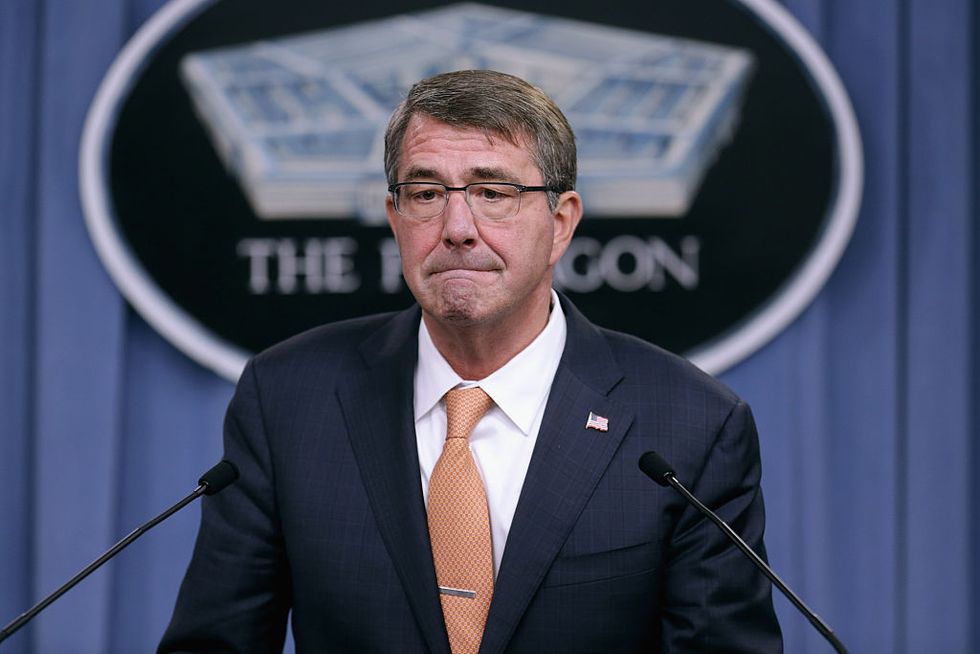
U.S. Defense Secretary Ashton Carter holds a news conference at the Pentagon, October 23, 2015. (Getty Images/Chip Somodevilla)

BAGHDAD (AP) — U.S. and coalition forces will use the newly retaken air base in Qayara as a staging hub, as Iraqi security forces move forward in the long-awaited battle to recapture Mosul from Islamic State militants, Defense Secretary Ash Carter said Monday as he arrived in Iraq.
Carter, who landed in Baghdad on an unannounced visit, said U.S. advisers are prepared to accompany Iraqi battalions if needed, as those units begin to encircle the key northern city.
#SecDef Carter arrives for meeting with #Iraq Minister of Defense Ubadi. pic.twitter.com/gKyUJL2NHR
— U.S. Dept of Defense (@DeptofDefense) July 11, 2016
A senior defense official said it's not clear when U.S. advisers would begin accompanying the battalions closer to the battlefront. But it could be in the coming weeks and months. The U.S. officials said a team of American troops went into Qayara for a quick site assessment Sunday and left.
One job they could do would be to help the Iraqis troops use highly technical bridging capabilities to get across the river into Mosul.
Carter laid out the U.S. vision for Qayara for the first time, describing its recapture as a key strategic victory. Speaking to reporters before he arrived in Baghdad, he said the air base will be one of the hubs from which "Iraqi Security Forces, accompanied and advised by us as needed, will complete the southern-most envelopment of Mosul. That's its strategic role, and that's its strategic importance."
Carter compared the role of Qayara to how forces used the eastern city of Makhmour. There, U.S. troops set up a fire base for artillery to support advancing Iraqi units. Marine Staff Sgt. Louis F. Cardin was killed at the fire base in March in an IS rocket attack.
"The point of seizing that (Qayara) airfield is to be able to establish a logistics and air hub in the immediate vicinity of Mosul," Carter told reporters. "So, there will be U.S. logistics support."
Iraqi forces recaptured the air base from the Islamic State group on Saturday, in a victory hailed by Prime Minister Haider al-Abadi as a key step ahead of the Mosul fight. Residents of Mosul, Iraq's second largest city, should "get ready for the liberation of their areas," he said.
U.S. officials said that American advisers have already been working at the brigade level with Iraqi special operations forces, but they have not yet accompanied Iraqi Army brigades, U.S. officials said.
The officials were not authorized to discuss the matter publicly, so spoke on condition of anonymity.
President Barack Obama in April approved plans to allow U.S. troops to assist Iraqi forces at the brigade and battalion level, where they could be at greater risk, closer to the battle, but still behind the front lines. They had previously been limited to advising at the headquarters and division levels, which are further from the battle.
Carter is expected to meet al-Abadi and minister of defense Khalid al-Obeidi, as well as Lt. Gen. Sean MacFarland, the top U.S. military commander for the Islamic State fight. The main topic, he said, will be the next steps in the military campaign, with a particular focus on Mosul.
Mosul is considered crucial. It was captured by IS in the summer of 2014 and the extremist group has been using it as a main headquarters since.
Carter's daylong visit to Iraq comes on the heels of the two-day NATO summit where allies agreed to expand their military support for the war.
This is Carter's fourth trip to Iraq as Pentagon chief, and his second in three months, to assess the campaign to oust Islamic State militants from the country.
Qayara is the latest in a string of successful operations by Iraqi forces, backed by coalition airstrikes. Government troops have also retaken the city of Ramadi and a number of towns along the route to Mosul.
One of the defense officials said the Pentagon identified 10 initial goals for the Iraq fight earlier this year, and with the recapture of Qayara, all 10 have now been achieved. A number of those 10 included retaking some of those cities.
Islamic State militants, however, still control large swaths of the country and continue to launch deadly attacks, including the massive suicide bombing July 3 at Baghdad's bustling commercial area of Karada. As many as 186 died in the attack.
And late Thursday, an attack at a Shiite shrine north of Baghdad killed 37 people. The Islamic State group claimed responsibility for both attacks.
During his visit to Iraq in April, Carter unveiled a series of moves to provide additional military support to the Iraqis, including the deployment of 200 more U.S. troops to Iraq, embedding advisers with Iraqi brigades and battalions, and using Apache attack helicopters at the request of the Iraqi government, when they were needed in battle.
During the NATO summit this past weekend, allies also approved several moves to expand military aid in the fight. NATO will use surveillance aircraft to collect intelligence, and will begin training Iraqi forces inside the country.
Until now, NATO has been training Iraqis in Jordan.
President Barack Obama has authorized a U.S. troop level of 4,087 in Iraq.
—